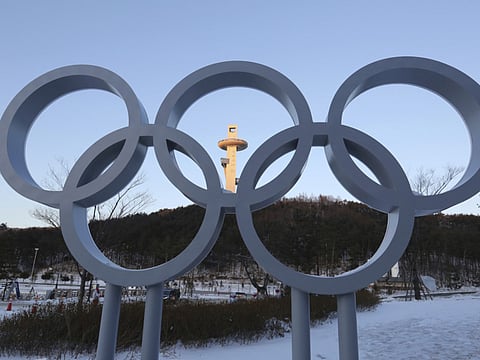Korean thaw could be Winter Olympics legacy
While ties between North and South Korea are at least temporarily warmer, tensions between Pyongyang and Washington continue to remain high

Although the 2018 Winter Olympics have not yet started in South Korea, they may already have delivered an unexpected geopolitical dividend. The recent mini-rapprochement between North Korea and the South has thawed ties, and the key question now is whether this will be sustained and significant.
Pyongyang confirmed earlier this month that it will send athletes and cheerleaders to the Games in PyeongChang, starting on February 9, after the nation’s first high-level, bilateral talks with Seoul in two years. The latter said that it will temporarily lift sanctions to allow the former to attend the Olympics.
The unexpected bilateral warming began with North Korean leader Kim Jong-un’s New Year message that the Olympics would be a “good opportunity to show unity of the people”. He also spoke of potentially melting “frozen North-South relations”, and since then, the two nations have re-opened a diplomatic hotline, and the Trump team has also consented to suspend joint military drills previously scheduled to coincide with next month’s Games.
Should the Olympics ultimately help contribute to a sustained thaw in relations in coming months, it would prove a surprise very few anticipated even in December. Only then, US Ambassador to the United Nations Nikki Haley had painted a bleaker scenario after months of rising tensions in the peninsular: That security challenges from North Korea meant that it was an “open question” whether US athletes would be able to compete at next month’s Games because of the problem “of how we protect US citizens in the area”.
The shifting sands of January underlines that while hosting such major sporting contests often still commands significant national prestige, they have considerable unpredictability with several such recent events having been plagued by political and wider risks and controversies. Take the example of the most recent Summer Olympics in Brazil in 2016. When Rio won in 2009 the right to host the Games, the national economy was booming and the country was enjoying significantly enhanced international prestige as a leading emerging market within the so-called Brics group of nations. By 2016, however, Brazil was mired in political crisis surrounding the impeachment of president Dilma Roussef, and the worst recession in decades, which forced significant spending cuts to the Olympic budget.
This difficult backdrop for hosting the Olympics was worsened when more than 100 prominent doctors and professors wrote an open letter to the World Health Organisation asking for the Games to be postponed or moved from Brazil “in the name of public health”. This was in light of the widening Zika outbreak, which became the worst health crisis facing Brazil since at least 1918, according to the Oswaldo Cruz Foundation, a leading health research institution based in Rio.
The problems associated with staging the Olympics were also exemplified by the Summer Games in Athens in 2004, which occurred just before Greece’s slide into economic turmoil. Those Games, at that stage the most expensive Olympics ever, are estimated to have cost around $12 billion (Dh44.13 billion), but only generated about $3 billion in income.
Athens 2004 became a symbol for the period of profligate public spending and unsustainable borrowing in the country at the turn of the millennium, and within days of the Olympic closing ceremony, the Greek government warned Brussels that the nation’s public debt and deficit would be significantly worse than anticipated. In 2005, the country became the first Eurozone country to be placed under fiscal monitoring by European Union authorities.
Whether the 2018 Winter Games can command a more positive narrative and stronger legacy remains in the balance some two weeks before the opening ceremony. In part, this is because while ties between North and South Korea are at least temporarily warmer, tensions between Pyongyang and Washington remain high.
This month, for instance, saw the spectacle of United States President Donald Trump remarking that the size of his “nuclear button” is bigger and more powerful than Kim’s in North Korea. The latter had earlier made the unwise boast, following recent missile and nuclear tests, that “the entire mainland of the US is within the range of our nuclear weapons and the nuclear button is always on the desk of my office”.
With the US homeland looking increasingly vulnerable, and the prospect of further North Korean missile and nuclear tests in 2018, Trump and some key allies in the region, including Japan, want to intensify international pressure on Pyongyang, which may lead to new spikes in tensions. Aside from the possibility of military force, scenarios include further sanctions, and the possibility of a naval blockade to enforce existing sanctions — including interdicting ships suspected of selling North Korea weapons abroad, one of the regime’s key sources of income.
This backdrop underlines the fragility of the unexpected window of opportunity that has opened up. Securing a significant and sustained de-escalation in tensions on the peninsula will not be easy, even with a previously unanticipated Olympic dividend.
Andrew Hammond is an Associate at LSE IDEAS at the London School of Economics.


